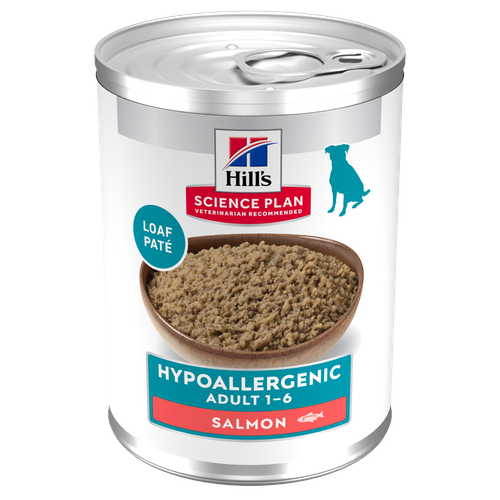
-
Find the right food for your petTake this quiz to see which food may be the best for your furry friend.Find the right food for your petTake this quiz to see which food may be the best for your furry friend.Featured products
 Adult Wet Dog Food with Beef
Adult Wet Dog Food with BeefHill's Science Plan Adult Multipack Wet Dog Food with Chicken, Beef & Turkey are complete premium pet foods for adult dogs from 1 year. Your dog will love these deliciously smooth and savoury minced loaves, formulated for balanced nutrition and overall health.
Shop Now Puppy Food
Puppy FoodHill's Science Plan Puppy Multipack Wet Dog Food with Chicken & Beef are complete premium pet foods for growing puppies from weaning until 1 year old and for pregnant and nursing dogs. Your puppy will love these deliciously smooth and savoury minced loaves, formulated for balanced nutrition and overall health.
Shop Now Mature Adult Dog Food
Mature Adult Dog FoodHill's Science Plan Mature Adult Multipack Wet Dog Food with Chicken & Beef are complete premium pet foods for mature adult dogs from 7 years. Your dog will love these deliciously smooth and savoury minced loaves, formulated to deliver the appropriate amount of energy to support the needs of adult dogs.
Shop NowFeatured products Adult Multipack Wet Cat Food with Beef, Ocean Fish & Chicken
Adult Multipack Wet Cat Food with Beef, Ocean Fish & ChickenTender chunks in gravy for cats, with high-quality protein to maintain lean muscle. With vitamin E and omega-3s & -6s for healthy skin and balanced minerals to support healthy vital organs.
Shop Now Mature Adult Wet Cat Food with Chicken
Mature Adult Wet Cat Food with Chicken
Tender chicken chunks in gravy for mature adult cats. Made with easy-to-digest ingredients, high-quality protein for lean muscle maintenance and antioxidant vitamins C+E for optimal health.
Shop Now Light Adult Multipack Wet Cat Food with Chicken & Ocean Fish
Light Adult Multipack Wet Cat Food with Chicken & Ocean FishTender chicken chunks in gravy for cats, with L-carnitine and fewer calories for ideal weight management. Packed with high-quality protein, omega-6s, and vitamin E for shiny fur and healthy skin.
Shop Now -
Dog
- Dog Tips & Articles
-
Health Category
- Weight
- Food & Environmental Sensitivities
- Urinary
- Digestive
- Joint
- Kidney
-
Life Stage
- Puppy Nutrition
- Adult Nutrition
- Senior Nutrition
Cat- Cat Tips & Articles
-
Health Category
- Weight
- Skin & Food Sensitivities
- Urinary
- Digestive
- Kidney
-
Life Stage
- Kitten Nutrition
- Adult Nutrition
Featured articles Show some love with wet foods: a great choice for pets with health issues
Show some love with wet foods: a great choice for pets with health issuesShow some love with wet foods: a great choice for pets with health issues.
Read More The Right Diet For Your Pet
The Right Diet For Your PetIn people, the right diet is very important. If you are eating the wrong way for your metabolism, activity level, age and lifestyle you could end up with health issues.
Read More The Incredible Science Behind Your Pet's Microbiome
The Incredible Science Behind Your Pet's MicrobiomeLearn what your pet's microbiome is, how it contributes to your pet's gut and overall health, and why nutrition is important in maintaining healthy microbiomes.
Read More -


It’s long been said that Labradors are always hungry and seem to be bottomless pits when it comes to food. Some breeds, like the Labrador, are very food-motivated, while others, like border collies, are more task- and people-oriented. So why do Labradors spend their time seeking food and why are they more prone to becoming obese because of this?
There could be a few reasons your Labrador constantly appears ravenous, so let’s have a look at what those might be.
Are labradors genetically hungrier?
In 2016, a study in the journal Cell Metabolism found that Labradors and some closely related Flat Coat retrievers have a specific gene mutation that is absent from other dogs. This gene mutation affects their motivation for food, increases the likelihood of storing fat and makes them more prone to obesity. The study also found that this mutation was more common in dogs that were being selected as assistance dogs than those becoming pets.
The POMC gene, which is the affected gene, is also linked to obesity in humans and is involved in satiety. Satiety means feeling full. It seems that the mutation in Labradors means that they don’t seem to realise when they are full, so never feel satiated and will continue to look for food.
Other causes of hunger you should rule out
If you have a dog that constantly seems hungry, it may not just be their genes. When your dog looks at you with those pleading eyes, it can be really tempting to give in, but this can become a very vicious and unhealthy cycle. Dogs that are overweight as puppies go on to become overweight adult dogs and can be obesity-prone for life. With this in mind, if you do have a Labrador, it’s a good idea to be disciplined right from the word go when it comes to food and meal-time behaviour.
Talk to your vet about body condition score (BCS). This is a way to make sure your dog is an ideal weight for their size, breed and age. Keeping your dog slim throughout life has many health benefits.


Tasty Tips
Avoid bad feeding habits with your dog
Get into good habits when it comes to your food. Dogs that are allowed to scavenge can become a real nuisance at mealtimes and it can be a hard habit to break once it’s ingrained. They may appear hungry, but they are just playing the game because they know it works. Make sure everyone in the family, including visitors, knows that feeding the dog from the table is not allowed.
Weigh out your dog’s ration of food so you don’t leave it to guess work. If your Labrador, or any dog for that matter, seems hungry during the day, split the daily ration into three or four meals. If this doesn’t help, speak to your vet about whether a more filling, lower-calorie food might be appropriate to help with the hunger pangs.
Dog parasites
Make sure your dog’s worming treatment is up to date. Although heavy worm infestations are not very common these days, worms can still be an issue, especially if your greedy dog is eating all sorts of unsavoury bits and bobs when out on walks. The difference here is that dogs that are hungry because of worms won’t gain weight, and may even lose weight.
Medical issues
Labradors are more prone to certain diseases, which might also make obesity more of a problem. Elbow and hip issues are pretty common in the breed, and if your dog can’t exercise they will need fewer calories. With orthopaedic problems, it’s especially important to keep them slim to keep the stress on their joints to a minimum.
Labradors are also prone to hypothyroidism, which is an underactive thyroid gland. The thyroid controls the metabolism, so dogs affected by this tend to be lethargic, hungry and prone to easy weight gain. If your vet suspects hypothyroidism, they will need to do certain blood tests to confirm or rule it out.
In summary
Although your Labrador might have a genetic excuse for being a greedy guts, it’s still really important that you control their weight. Obesity is very bad for your dog’s health and is proven to shorten their lifespan. For maximum time with your furry friend, stay strong and don’t give in to those big, hungry eyes!
Reviewed by Dr. Hein Meyer, DVM, PhD, Dipl-ECVIM-CA


One of our staff authors prepared this article for you
Related products

Hill's Science Plan Adult Multipack Wet Dog Food with Chicken, Beef & Turkey are complete premium pet foods for adult dogs from 1 year. Your dog will love these deliciously smooth and savoury minced loaves, formulated for balanced nutrition and overall health.

Hill's Science Plan Puppy Multipack Wet Dog Food with Chicken & Beef are complete premium pet foods for growing puppies from weaning until 1 year old and for pregnant and nursing dogs. Your puppy will love these deliciously smooth and savoury minced loaves, formulated for balanced nutrition and overall health.

Hill's Science Plan Mature Adult Multipack Wet Dog Food with Chicken & Beef are complete premium pet foods for mature adult dogs from 7 years. Your dog will love these deliciously smooth and savoury minced loaves, formulated to deliver the appropriate amount of energy to support the needs of adult dogs.

Hill's Science Plan Hypoallergenic Adult Wet Dog Food with Salmon is a complete premium pet food for all adult dogs from 1 year. This savoury tinned loaf is specially formulated for dogs with delicate skin and stomachs. It features a single novel animal protein source and is grain-free.
Related articles

Learn about the potential health risks of a raw diet for dogs and why they aren't the best option for your pup or you.

Learn effective tips for feeding a dog that's a picky eater and ensure proper nutrition for a finicky eater. Discover tips for pet parents at Hill's Pet UK.

How, when and what to feed your new puppy is an important decision, learn more about the things to consider for feeding your puppy.

Many human foods are dangerous to dogs. Read about 5 of the worst toxic food offenders that can kill your dog - and how much it takes to hurt them.

Put your dog on a diet without them knowing
Our low calorie formula helps you control your dog's weight. It's packed with high-quality protein for building lean muscles, and made with purposeful ingredients for a flavourful, nutritious meal. Clinically proven antioxidants, Vitamin C+E, help promote a healthy immune system.
Put your dog on a diet without them knowing
Our low calorie formula helps you control your dog's weight. It's packed with high-quality protein for building lean muscles, and made with purposeful ingredients for a flavourful, nutritious meal. Clinically proven antioxidants, Vitamin C+E, help promote a healthy immune system.

